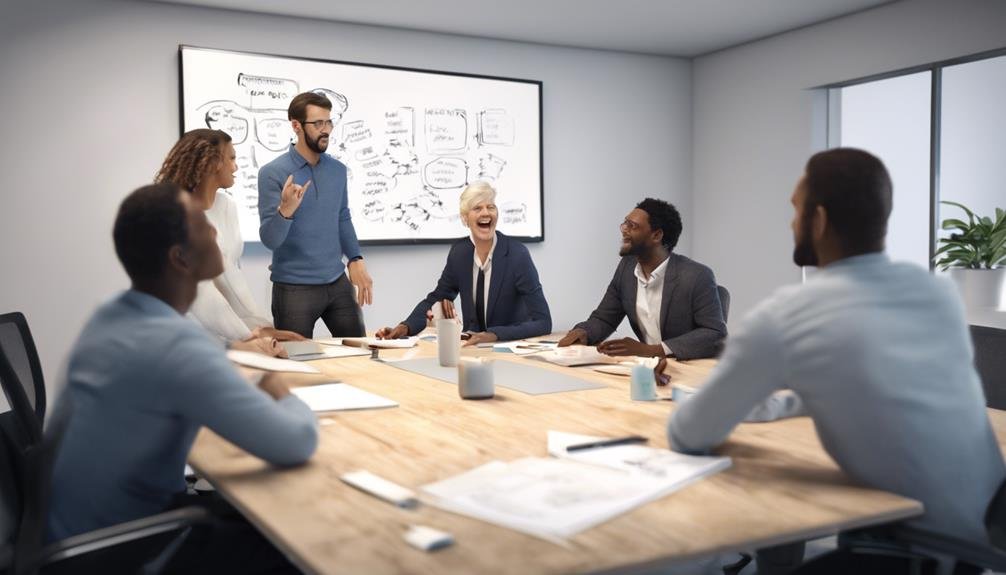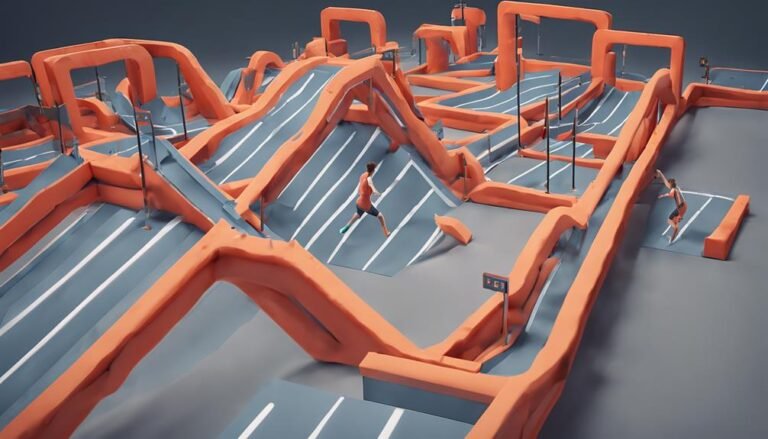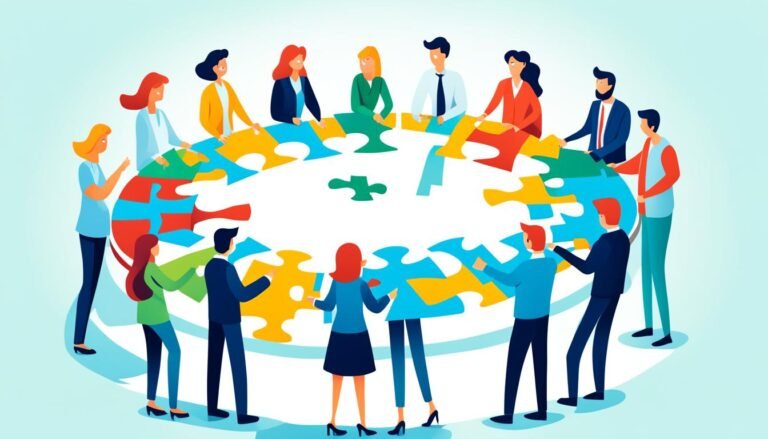Facilitation as a Soft Skill
Enhance your professional toolkit with facilitation as a soft skill. It boosts team collaboration, refines communication, resolves conflicts, and boosts productivity. Learn more by diving into the nuances and tips to master facilitation techniques.
Key Takeaways
- Facilitation as a soft skill enhances leadership abilities in guiding discussions and managing conflicts effectively.
- It fosters a collaborative environment, encouraging innovative solutions and team cohesion.
- Facilitation skills are essential for leadership development and promoting open dialogue.
- Facilitation promotes team collaboration, communication effectiveness, and conflict resolution strategies.
- Active participation, communication techniques, and fostering group dynamics are key aspects of facilitation as a soft skill.
Importance of Facilitation Skills
Understanding the importance of facilitation skills can greatly enhance your ability to lead productive and efficient group discussions. In the domain of leadership development, possessing strong facilitation skills is essential. By honing these skills, you're better equipped to guide discussions, manage conflicts, and guarantee all voices are heard. Effective facilitation fosters a collaborative environment where team members feel valued and engaged, leading to more innovative solutions and stronger team cohesion.
When it comes to team building techniques, facilitation plays a vital role. As a facilitator, you set the tone for the discussion, establish clear objectives, and keep the conversation focused and on track. Your ability to ask probing questions, listen actively, and summarize key points not only keeps the discussion productive but also encourages team members to actively participate and contribute their unique perspectives.
In essence, mastering facilitation skills is a valuable asset for any leader looking to elevate their team's performance and foster a culture of collaboration and creativity.
Impact on Team Collaboration
Facilitation skills have a significant impact on promoting team collaboration and enhancing overall productivity. When effectively applied, these skills can greatly influence team dynamics and foster a collaborative environment.
Here are four key ways in which facilitation skills can positively impact team collaboration:
- Understanding Team Dynamics: By utilizing facilitation techniques, you can gain insights into team dynamics, such as individual roles, communication patterns, and conflict resolution mechanisms. This understanding allows you to tailor your approach to enhance collaboration within the team.
- Promoting Collaboration Strategies: Facilitators play an important role in promoting collaboration strategies by encouraging active participation, fostering a sense of belonging, and aligning team goals with individual objectives. This helps in creating a cohesive team that works towards a common purpose.
- Adapting Communication Styles: Effective facilitation involves adapting communication styles to suit the preferences and needs of team members. By being versatile in your communication approach, you can make sure that information is conveyed clearly and that all team members feel heard and understood.
- Encouraging Open Dialogue: Facilitators create a safe space for open dialogue where ideas can be freely shared, feedback can be constructively given, and diverse perspectives can be appreciated. This open communication environment cultivates trust among team members and promotes a culture of collaboration.
Enhancing Communication Effectiveness
Enhancing the effectiveness of communication within a team requires a key focus on adapting communication styles to suit individual preferences and fostering an open dialogue environment. By tailoring your communication approach to match the needs of your team members, you can greatly improve relationships and build trust within the group.
To enhance communication effectiveness, it's essential to actively listen to your team members, show empathy, and be open to receiving feedback. When team members feel heard and understood, it fosters a sense of trust and respect, laying a solid foundation for effective communication.
Encouraging open and transparent communication channels can also improve relationships and build trust among team members. Create a safe space where everyone feels comfortable sharing their thoughts, ideas, and concerns. This open dialogue environment promotes collaboration and ensures that everyone's voice is heard and valued.
Role in Conflict Resolution
In conflict resolution, maintaining a pivotal stance is essential to effectively mediating disputes and finding mutually beneficial solutions. When facilitating conflict resolution, your role is pivotal in guiding the process towards a positive outcome. Here are four key aspects to ponder:
- Mediation Techniques: Utilize active listening and reframing to help parties understand each other's perspectives better and work towards a resolution collaboratively.
- Team Dynamics: Understand the underlying dynamics within the group to address any power imbalances or communication issues that may be contributing to the conflict.
- Conflict Resolution Strategies: Implement strategies such as brainstorming, compromising, or problem-solving to assist the conflicting parties in reaching a consensus.
- Group Cohesion: Foster a sense of unity and cooperation among team members throughout the conflict resolution process to guarantee that relationships are maintained and strengthened post-resolution.
Driving Productivity and Innovation
To drive productivity and innovation, you must focus on enhancing team collaboration and fostering creative problem-solving.
By facilitating effective communication and encouraging diverse perspectives, you can create an environment that fuels innovation.
Embracing facilitation as a soft skill can lead to increased productivity and a culture of continuous improvement within your team or organization.
Enhancing Team Collaboration
Effective team collaboration is a key driver of productivity and innovation in the workplace. To enhance team collaboration, consider the following strategies:
- Establish Clear Goals: Clearly define objectives to guarantee everyone is on the same page.
- Encourage Open Communication: Create a culture where team members feel comfortable sharing ideas and concerns.
- Promote Diversity: Embrace diverse perspectives and skills within the team to foster creativity.
- Implement Team-Building Activities: Engage in activities that strengthen relationships and trust among team members.
Fostering Creative Problem-Solving
Enhance your team's problem-solving capabilities by fostering a culture that nurtures creativity and innovation. Promoting collaboration among team members can lead to a diverse range of perspectives and ideas, driving productivity and innovation.
Encouraging brainstorming sessions provides a platform for individuals to freely express their thoughts and explore unconventional solutions to challenges. By creating an environment that values creativity, you empower your team to think outside the box and come up with inventive ways to tackle problems.
Embrace a mindset that celebrates experimentation and learning from failures, as this can spark new ideas and propel your team towards breakthrough solutions. Remember, fostering creative problem-solving is a continuous process that requires dedication and openness to new approaches.
Tips for Developing Facilitation Skills
When honing your facilitation skills, focus on:
- Active listening techniques
- Engaging group dynamics
These strategies can help you create a productive and inclusive environment for effective communication and collaboration.
Active Listening Techniques
To enhance your facilitation skills, incorporating active listening techniques is essential for fostering effective communication and collaboration in group settings. Active listening involves not just hearing but truly understanding the speaker's message.
Here are four techniques to improve your active listening skills:
- Maintain eye contact and use affirming nods or gestures to demonstrate your engagement.
- Paraphrase or summarize what the speaker said to guarantee clarity and confirm understanding.
- Ask open-ended questions to encourage elaboration and deeper conversation.
- Practice reflective listening by echoing the speaker's feelings to demonstrate empathy and build rapport.
Engaging Group Dynamics
To effectively navigate group dynamics and elevate your facilitation skills, focus on cultivating an environment that encourages active participation and collaboration among members. Group participation is crucial for successful facilitation, so make sure all members feel included and valued.
Use communication techniques such as active listening, open-ended questions, and summarizing key points to keep discussions flowing smoothly and engage everyone in the conversation. Be mindful of non-verbal cues and body language to gauge the group's mood and adjust your approach accordingly.
Encouraging group collaboration and sharing responsibilities can foster a sense of ownership among members, leading to more productive and harmonious interactions. By honing these skills, you can become a more effective facilitator and harness the power of group dynamics to achieve common goals.
Conclusion
To sum up, mastering facilitation as a soft skill can transform team dynamics and communication within any organization. By honing your facilitation skills, you can foster collaboration, resolve conflicts, and drive productivity and innovation.
Remember, practice makes perfect, so keep refining your skills and watch as your ability to facilitate grows. Embrace the power of facilitation and see the positive impact it can have on your team and work environment.








